HARLINGEN — For nearly two years, City Commissioner Frank Puente has pushed to allow outside ambulance companies to offer residents choices when it comes to calling for help.
During most of that time, the city’s previous commission stood behind an ordinance giving the South Texas Emergency Care Foundation exclusive rights to provide ambulance service within the city limits.
After the May election shifted its balance of power, the commission’s new majority is apparently backing Puente’s push to open the city to ambulance companies offering non-emergency transport service.
However, STEC’s warning competition in the lucrative non-emergency transport business would eat into its revenue stream, forcing the nonprofit to cut into its emergency medical services — a move that could lead the city to help fund emergency transports.
Now, Puente and Commissioner Richard Uribe are proposing commissioners amend the ordinance to scrap the clause offering STEC its exclusive service rights during a meeting Wednesday.
STEC says competition would cut into revenue
For months, Puente has argued some of STEC’s non-emergency responses have slowed while many ambulances have waited hours for short-staffed hospitals to open patient beds during the coronavirus pandemic.
That’s led some residents to wait for ambulances to respond to non-emergency calls, he said.
“We need to remove this ordinance to allow other ambulatory services,” he said Monday, describing STEC as a “monopoly.”
Meanwhile, STEC argues a move to open the city to outside ambulance companies offering non-emergency transport would cut $600,000 to $1.2 million in revenue, forcing the company to lay off 14 employees, Puente said.
“I think that’s a scare tactic,” he said. “Their answer is unsatisfactory. I’m not concerned about their bottom line. My concern is optional services the citizens should have.”

City could face funding emergency service
However, Mayor Chris Boswell, who’s standing behind the company which local leaders founded more than 40 years ago, said the city might be forced to help fund emergency ambulance service if competition eats into STEC’s money-making non-emergency transport business.
“I think it would be a huge mistake to remove the exclusivity provision,” Boswell said. “The non-emergency transport service that STEC is doing helps pay for the 911 services. It will definitely impact our 911 service, potentially reducing the number of ambulances and staff because of revenues lost.”
For years, the city paid STEC as much as $500,000 a year to help fund its operations, he said.
Then about 10 years ago, the company began charging its patients instead of the northern Cameron County cities with which it contracts.
“Certainly, if we want a reliable, first-class 911 service and they lose enough revenue from non-emergency transport services, yes, we may have to fund 911 services,” Boswell said.
Background
Last month, STEC officials warned opening the doors to competition would cut into their non-emergency transport service that helps offset the high costs of offering emergency care.
A move to open the city to outside ambulance companies offering non-emergency transport could strip STEC of as much as half its revenue, Gavino Sotelo, a member of STEC’s board of directors, told commissioners during a heated, two-hour workshop.
About four years ago, STEC boosted its rates to range from $795 for basic life support to $1,220 in the area where about half its patients are on Medicare and Medicaid, which reimburses about a third of billings, Leonard Callier, the company’s deputy executive director, told commissioners, describing rates as based on “one of the lowest fee schedules in the Valley.”
Now, the nonprofit which offers ambulance service across most of Cameron County, stations eight to 11 ambulances in the Harlingen area, officials said.
Agreements with other regional emergency services companies offer the city back-up ambulance service, they said.
Meanwhile, STEC’s annual $4.5 million payroll funds the positions of 90 employees, including 64 paramedics and emergency medical technicians whose salaries range from $48,000 to $66,000.
During the workshop, commissioners argued competition could help bring down rates.
About a month ago, a McAllen ambulance company offered to transport a nursing home resident to a Houston hospital for $2,700 while STEC was charging $4,500, Commissioner Perez said.




